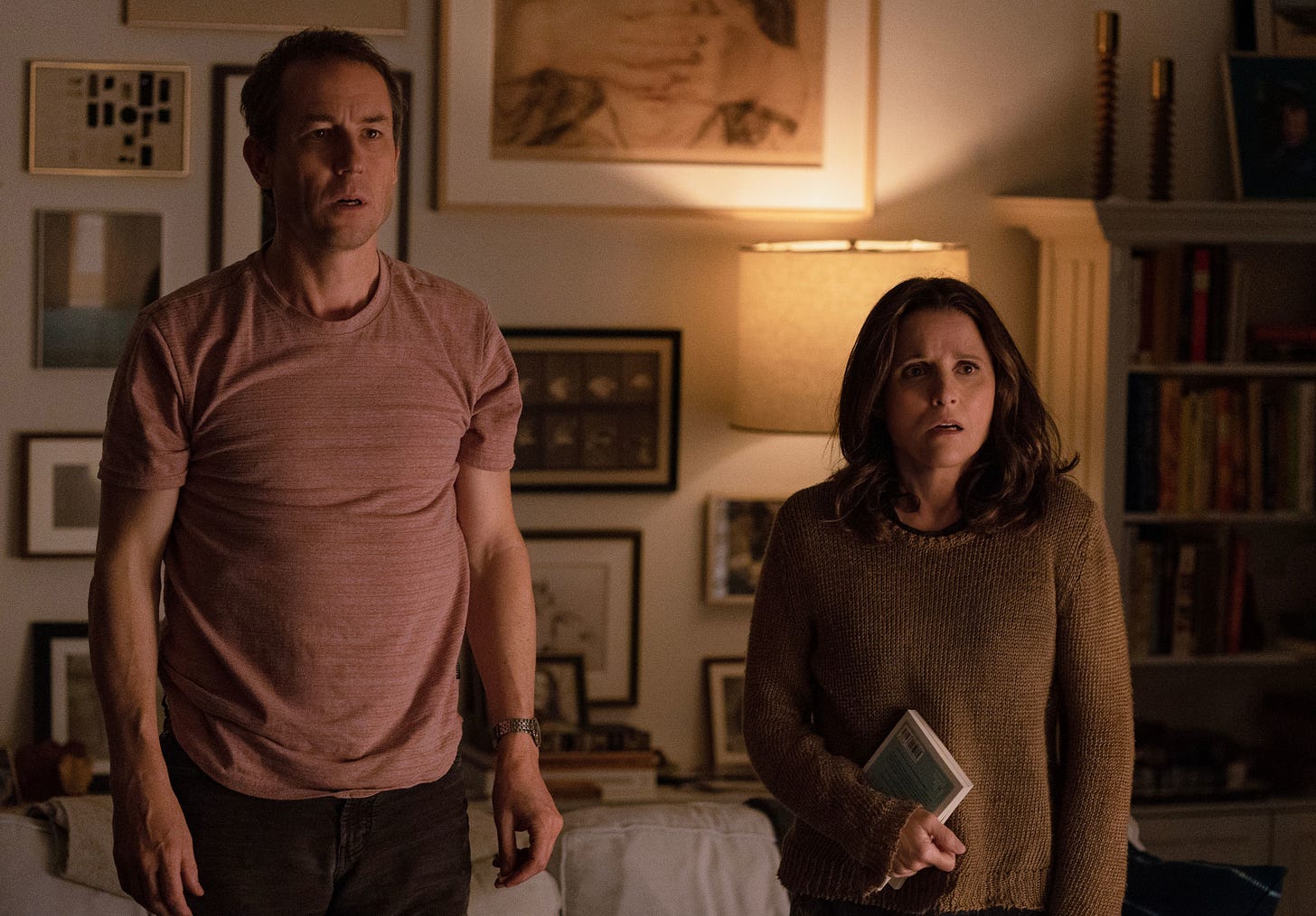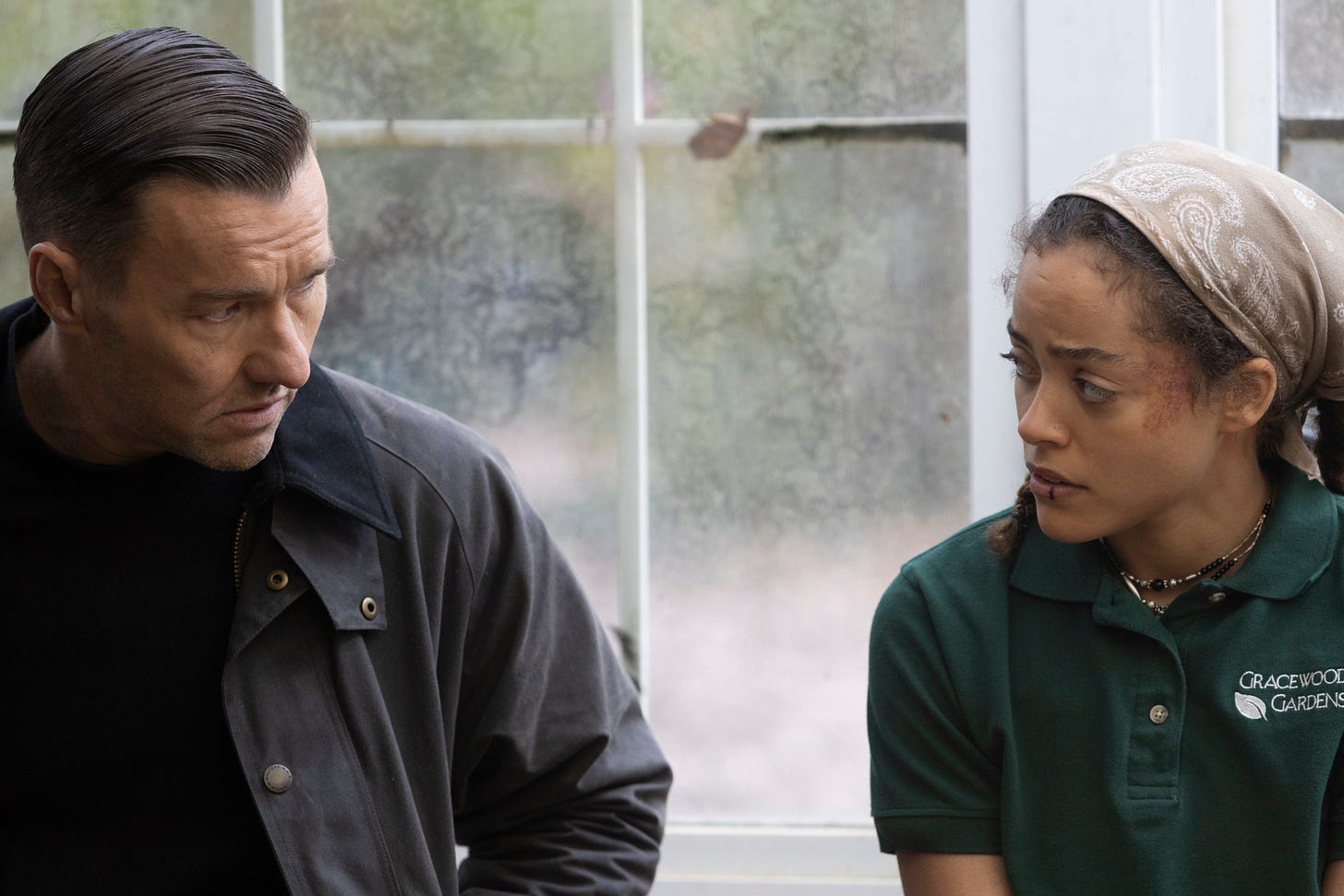‘You Hurt My Feelings’ and ‘Master Gardener’ Reviews
It’s the summer indie season.
You Hurt My Feelings, in theaters now, is a date-night movie that feels as though it was designed to make the rest of date night uncomfortable, a probing look at a happy marriage that spins emotionally out of control when a white lie is accidentally uncovered.
Don (Tobias Menzies) is a therapist who isn’t sure he’s any good at talking people through their problems, given the way a couple (played by real-life couple David Cross and Amber Tamblyn) he counsels bickers endlessly on his couch or the way Jim (Zach Cherry) mutters about the uselessness of their time together as he exits his sessions. Don is himself married to Beth (Julia Louis-Dreyfus), a writer who isn’t sure she’s any good at writing despite the fact that her memoir was published to some acclaim and decent sales; her agent isn’t into her debut novel, and she’s not sure if she’s stuck teaching because she can’t do.
In other words, You Hurt My Feelings is, at least in part, a movie about Impostor Syndrome, the mental plague that afflicts nearly every member of post-collegiate1 society who failed to be blessed with the preternatural self-confidence of a tech overlord or the willful ignorance of an NFT proponent. You see it also in Beth’s sister, Sarah (Michaela Watkins), who isn’t sure she’s providing any value to the world as an interior designer for the type of ludicrously rich person who can afford a $19,000 bench. And Sarah’s husband, Mark (Arian Moayed), an actor off- (or possibly off-off-) Broadway, who gets fired from the play he’s working on and goes into an existential tailspin.
All of us Impostors exist on a fairly thin knife’s edge: happy we’ve been able to make whatever variety of bullshit we do work for ourselves but also suspicious (if we’re not stone-cold certain) that it’s all going to come crashing down at any second. Beth is pushed off that edge when she overhears Don tell Mark in confidence that he doesn’t like her novel; Beth, having been assured repeatedly by Don that it’s great, goes into a tailspin. Maybe it’s not any good. Maybe she isn’t any good. Either way, how’s she supposed to be able to trust him any longer?
Writer-director Nicole Holofcener keeps things compact, almost literally: this is one of those movies that feels like it was shot in a real New York apartment, with Beth and Don practically on top of each other in their bathroom and their living room. Cozily cramped. Until the coziness turns claustrophobic, the loved one Beth shares her space with now assumed to be an emotional interloper.
Julia Louis-Dreyfus is as wonderful as you’d expect: there’s something simultaneously absurd about Beth’s reaction and devastatingly human; we all know, intellectually, that white lies designed to protect egos are a fundamental part of all relationships, but we also know, emotionally, how it would feel to have them uncovered. However, it’d be really lovely if Tobias Menzies were able to make a late-career break as a leading man in movies of this size and sort. I’ve been a fan ever since HBO’s Rome, his portrayal of Brutus depicting a variety of sad delusion that never tips over into pomposity. Despite his Judas turn, we do not revel in his downfall; Menzies portrays Brutus as a man who was simply caught up in the tides of history.
Menzies’s Brutus moment in You Hurt My Feelings is on a smaller scale, of course, and of less historical import. But in a summer of cinematic excess, it’s nice to be occasionally treated to something a little more intimate.
Master Gardener, available via VOD now, is the capstone of Paul Schrader’s late-stage trilogy about God’s Lonely Modern Men. First up was First Reformed’s Pastor Ernst Toller (Ethan Hawke), whose Travis Bickle-esque descent into self-righteous madness2 leads him to strap on a suicide vest to save the planet. Then came The Card Counter’s William Tell (Oscar Isaac), a former interrogator at Abu Ghraib who learned how to play poker but not how to silence the demons he developed while living and working amid the machinery of torture.
Now entering their esteemed company is Narvel Roth (Joel Edgerton), a horticulturalist whose long-sleeve work shirts hide tattoos of swastikas and the numbers 14/88 and the phrase “white power.” Formerly a white nationalist gang’s hitman, Narvel has entered witness security and now works at Gracewood Gardens, which one might describe as an estate but really resembles a plantation, with its large white home with a massive porch overlooking the gardens before it. Gracewood is overseen by Norma Haverhill (Sigourney Weaver), who asks Narvel to take her grandniece, Maya (Quintessa Swindell), under his wing and show her how to maintain the gardens in the hopes that she will be fit to assume the reins of Gracewood after Norma dies. When Narvel and Maya are believed to be in a relationship, they are literally cast out of the garden for having tasted each other’s forbidden fruits; they wander a land of sin trying to find redemption, only to return when their talents are needed by Norma.
“Gardening is a belief in the future,” Narvel writes in his journal. “That change will come in its due time.” Perhaps this is why, of Schrader’s God’s Lonely Modern Men, Narvel is the most forward-looking, the most hopeful of them. The three of them—Narvel, William, and Ernst—are nearly brothers in their similarity: slick-backed hair tightly cropped at the sides; taciturn but tense beneath the surface; prone to sitting in a darkened room, writing longhand in journals, not searching their feelings so much as trying to expurgate them.
Whereas William and Ernst have succumbed to despair, or something like it, Narvel truly believes in the power of redemptive change. Schrader knows how to push buttons—in film and real life alike; at one point during the release of The Card Counter, the distributor demanded he stop posting to Facebook because he couldn’t help but trigger social media’s nannies—which may help explain just how he settled on a Nazi as the most sympathetic of his Modern Lonely Men.
Both Edgerton and Weaver deliver performances that are clipped and mannered and manicured in a way that calls to mind the French formal gardens we learn of in voiceover: the line deliveries and facial expressions are practically geometric in their cold precision. Swindell, on the other hand, is more wild; Maya is like an explosion of colors and feelings breaking down those artificial barriers. Still, she isn’t quite lively enough to break through the film’s cold exterior, and as such Master Gardener feels like the least of Schrader’s recent run.
Liberal arts division.
I have written this elsewhere, but if we are to take First Reformed at face value, it is camp. The only way it really works as a work of art is if we are to see Toller instead as a Bickle-esque loner who trades religious faith for quasi-religious environmental extremism.




